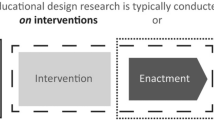Abstract
The Qualitative Inquiry Award began one afternoon when Robert deKieffer and Andrew Yeaman were discussing the current state of scholarship. Bob was the President of the Educational Communications and Technology (ECT) Foundation and Andrew had been chairing the Young Researcher Award for a couple of years. The ECT Foundation is a non-profit organization for charitable and educational purposes that has made a substantial commitment in support of Association for Educational Communications and Technology (AECT). These purposes reflect the belief that instruction can be improved with new systems for learning and with assessment of techniques for the communication of information. The Foundation funds leadership-training programs for AECT in addition to awarding scholarships, internships, and fellowships. The ECT Foundation’s Young Researcher Award is presented to the best paper reporting on a quantitative or qualitative study addressing a question related to educational technology. The winning paper receives special consideration for publication in Educational Technology Research and Development (ETR&D), the refereed scholarly research journal published by the AECT. However, a need had become apparent for recognizing and rewarding scholarship apart from quantitative research based in experimental psychology, which is what was being submitted for the Young Researcher Award at the time.
Based on an original narrative by Andrew R. J. Yeaman published in the 2011 Yearbook
Access provided by Autonomous University of Puebla. Download chapter PDF
Similar content being viewed by others
Keywords
- Educational Technology
- Professional Scholarship
- Literary Criticism
- Educational Purpose
- Educational Communication
These keywords were added by machine and not by the authors. This process is experimental and the keywords may be updated as the learning algorithm improves.
The Qualitative Inquiry Award began one afternoon when Robert deKieffer and Andrew Yeaman were discussing the current state of scholarship. Bob was the President of the Educational Communications and Technology (ECT) Foundation and Andrew had been chairing the Young Researcher Award for a couple of years. The ECT Foundation is a non-profit organization for charitable and educational purposes that has made a substantial commitment in support of Association for Educational Communications and Technology (AECT). These purposes reflect the belief that instruction can be improved with new systems for learning and with assessment of techniques for the communication of information. The Foundation funds leadership-training programs for AECT in addition to awarding scholarships, internships, and fellowships. The ECT Foundation’s Young Researcher Award is presented to the best paper reporting on a quantitative or qualitative study addressing a question related to educational technology. The winning paper receives special consideration for publication in Educational Technology Research and Development (ETR&D), the refereed scholarly research journal published by the AECT. However, a need had become apparent for recognizing and rewarding scholarship apart from quantitative research based in experimental psychology, which is what was being submitted for the Young Researcher Award at the time.
A special award was approved to run on a trial basis and in 1992 the competition was first offered. In 1995, the Foundation announced the creation of an on-going award. The prize was funded in perpetuity when Lida Cochran promised a bequest in memory of her late husband, Lee W. Cochran. The Award is only to be given when there is an outstanding application so there has not been a winner every year. However, reviewers have reported that the number of entries has continually increased over the years and the overall quality of the submissions continues to improve.
The Qualitative Inquiry Award recognizes qualitative insights into the social and cultural aspects of the professional field of ECT. This award encourages and recognizes qualitative understanding about ECT. The emphasis is on inquiry from disciplines such as anthropology, art criticism, cultural studies, history, literary criticism, philosophy, and sociology. The aim for the Award is to build awareness of the professional field’s purposes and its position in the world. The intention is to augment existing professional knowledge of how to do things through asking deeper questions about what should be done, why should it be done, and who is involved in the doing. Award recipients have a session reserved for them to give a presentation at the annual AECT conference and the author has the opportunity to publish in this Yearbook.
The Qualitative Inquiry Award is open to all relevant instructional areas including training. The main criteria are the use of social or cultural theory for the on-going development of scholarship in ECT. Co-authored submissions are not accepted. This award recognizes the contributions of individuals to professional scholarship. Membership in AECT is required. Consult the AECT web site for more information about the Qualitative Inquiry Award.
Author information
Authors and Affiliations
Corresponding author
Editor information
Editors and Affiliations
Rights and permissions
Copyright information
© 2013 Springer Science+Business Media New York
About this chapter
Cite this chapter
Branch, R.M. (2013). Introduction to the Qualitative Inquiry Award. In: Orey, M., Jones, S., Branch, R. (eds) Educational Media and Technology Yearbook. Educational Media and Technology Yearbook, vol 37. Springer, New York, NY. https://doi.org/10.1007/978-1-4614-4430-5_6
Download citation
DOI: https://doi.org/10.1007/978-1-4614-4430-5_6
Published:
Publisher Name: Springer, New York, NY
Print ISBN: 978-1-4614-4429-9
Online ISBN: 978-1-4614-4430-5
eBook Packages: Humanities, Social Sciences and LawEducation (R0)



